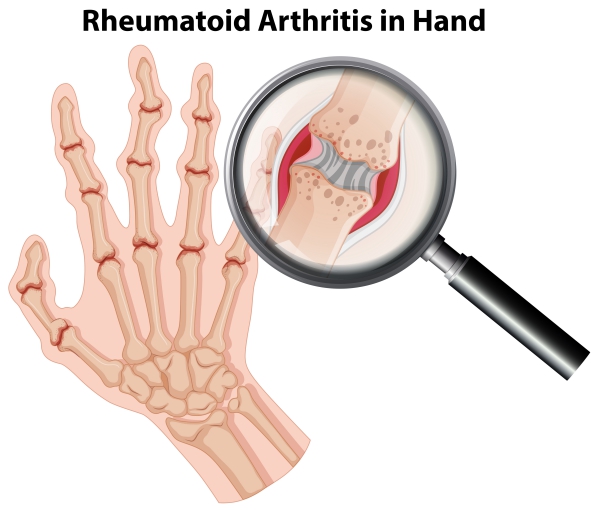What is rheumatoid arthritis?
Rheumatoid arthritis (RA) is an autoimmune disorder causing chronic inflammation in your body. It affects your joints, eyes, skin, heart, lungs and blood vessels. An autoimmune disorder is one whereby your immune system recognizes your own tissues as foreign and therefore send fighter cells to attack it.
Unlike osteoarthritis, rheumatoid arthritis usually affects both side of your body (for example, both of your hands will be affected at the same time). In addition, it causes swelling of your joints which will eventually lead to joint deformity and loss of bone mass.
Women are 3 times more at risk of developing rheumatoid arthritis than men. Each year worldwide, out of 10,000 people 3 will be affected by the disease. However, people affected by rheumatoid arthritis can live a normal live and prevent complications if you treat symptoms early and correctly.
Causes of rheumatoid arthritis
The precise cause of rheumatoid arthritis is still unknown. However, there are multiple factors that contribute to its onset:
- Cigarette smoking
- Obesity
- A history of Epstein-Barr Virus (EBV) infection; it causes mononucleosis which is also known as glandular fever or kissing disease
- Trauma to your joint; dislocations, fractures and ligament injury
Rheumatoid arthritis leads to chronic inflammation of your joints which makes your synovium (the lining of membranes that surround the inside of your joint) thicker. This may eventually lead to bone loss and joint deformity if left untreated.

Who is at risk?
Risk factors of rheumatoid arthritis include:
- Age: rheumatoid arthritis most commonly occurs during middle age, however, it can occur at any age
- Your sex: women are 3 times more at risk than men
- Family history: if you have a parent or sibling who suffers from rheumatoid arthritis, you are 2-3 times more likely of developing it.
- Obesity
- Cigarette smoking
- Environmental exposure: exposure to silica or asbestos can increase your risk of developing rheumatoid arthritis
Signs and symptoms of rheumatoid arthritis
The signs and symptoms of rheumatoid arthritis appear during a period called exacerbation or flare and when it disappears, this period is known as remission. During flares you may experience:
- Joint swelling
- Joint pain
- Joint stiffness: usually worse after inactivity and in the morning
- Joint deformity
- Loss of function of the joint
- Warm joint
- Fatigue
- Fever
- Loss of appetite
Usually the small joints are affected first such as the fingers and toes. This spreads to the larger joints such as knees, elbows, ankles, wrists, shoulders and hips. The particularity of rheumatoid arthritis is that is has a symmetrical distribution; meaning that it affects both sides of your body at the same time.

However, other structures may be affected besides your joints such as:
- Lungs
- Heart
- Skin
- Eyes
- Salivary glands
- Kidneys
- Bone marrow
- Blood vessels
- Nerve tissue

Diagnosis of rheumatoid arthritis
Rheumatoid arthritis can be diagnosed using a combination of:
- Detailed history taking where your doctor will ask you about your symptoms (for example when does the pain reached its maximum peak)
- Physical examination:
- examination of the joint range of motion and function
- testing for muscle strength and reflexes
- inspecting for swelling and redness
- checking the temperature of your affected joint (usually warm in rheumatoid arthritis)
- evaluating joint tenderness
- Imaging:
- Ultrasonography
- X-ray
- Magnetic resonance imaging
- Blood tests:
- Rheumatoid factor test(RF): this test is usually elevated in rheumatoid arthritis
- Anticitrullinated protein antibody test (anti-CCP): this is another test which can diagnose rheumatoid arthritis. However it is not always positive in all cases. In addition, it is more specific than the rheumatoid factor test
- Antinuclear antibody test: this test evaluates your immune system to see if it is producing antibodies
- Erythrocyte sedimentation rate (ESR): this test is elevated in diseases where there is inflammation
- C-reactive protein test: usually this test is elevated in rheumatoid arthritis. The C-reactive protein production by the liver increases whenever there is a severe infection or inflammation

Types of rheumatoid arthritis
There are mainly 3 types of rheumatoid arthritis:
- Seropositive rheumatoid arthritis: when your blood tests is positive for anti-CCP and rheumatoid factor, this indicates that your immune system is producing antibodies (fighter cells) against your own healthy tissues
- Seronegative rheumatoid arthritis: the diagnosis of rheumatoid arthritis can still be made even if the rheumatoid factor and anti-CCP test negative. This is because your doctor will look at your signs and symptoms, imaging and other blood tests. You may eventually develop antibodies, changing your diagnosis to seropositive rheumatoid arthritis.
- Juvenile rheumatoid arthritis (juvenile idiopathic arthritis): symptoms are similar to that of adult rheumatoid arthritis and it may be lifelong or temporary. In addition, this disease can impair growth and development of the child
Treatment of rheumatoid arthritis
The medications available help to reduce your pain, exacerbations, inflammation processes and limit injury to your joint. Home remedies and diet can also help to improve your symptoms.

Medications
The following medications reduces or slow down the injury caused to your body:
- Disease modifying antirheumatic drugs (DMARDs): This class of drug slowdown the progression of rheumatoid arthritis by inhibiting your body’s immune system
- Biologics: Instead of blocking your immune response entirely, it provides targeted-response to inflammation. It is usually used when DMARDs are not working for you.
- Janus kinase (JAK) inhibiting: This drug is used to stop injury to your joints and prevent inflammation. It is usually used when DMARDs and biologics are not effective.
The following medications are used to decrease inflammation and pain caused by rheumatoid arthritis:
- Acetaminophen
- Corticosteroids
- Non-Steroidal Anti-Inflammatory Drugs (NSAIDS)
Home remedies and lifestyle modifications:
Home remedies and lifestyle modifications may help to decrease your symptoms and improve your quality of life:
- Exercise: regular physical exercises help to strengthen your muscles, increase your mobility and improve the range of motion of your joint
- Cold compress: this decreases inflammation in your joint and reduces pain
- Rest: during exacerbation, getting enough sleep is important to recover faster
- Diet: foods high in omega-3 fatty acids such as fish and chia seeds help to reduce inflammation in your body. In addition, antioxidants (vitamins A, C and E) also have the same beneficial effects. Some foods containing antioxidants are spinach, carrots, dark chocolate and blueberries.

Complications of rheumatoid arthritis
Suffering from rheumatoid arthritis increases your risk of developing:
- Rheumatoid nodule: these are hard lumps that develops most commonly around pressure points
- Osteoporosis: this is a condition which weakens your bones and make it more prone to fractures
- Infections: the medications used to treat rheumatoid arthritis, impair your immune system and therefore makes you more susceptible to infections
- Dry eyes and mouth
- Carpal tunnel syndrome: when your wrists are affected by rheumatoid arthritis, the inflammation compresses the nerves causing numbness and tingling sensations
Prognosis
Treating rheumatoid arthritis early is very important in determining its outcome. Around 40% of patients become disabled after 10 years. However, 50 % of patients remain fully employed and can live a normal life, provided that treatment is followed properly.

Source:
J. Alastair, I. and Simon, M., 2016. Davidson’s Essentials of Medicine. 2nd ed. London: ELSEVIER.
Parveen, K. and Michael, C., 2017. Kumar & Clarks Clinical Medicine. 9th ed. The Netherlands: ELSEVIER.
Smith, H., 2019. Rheumatoid Arthritis (RA)


